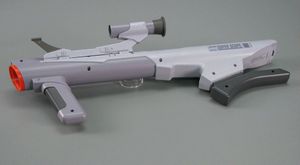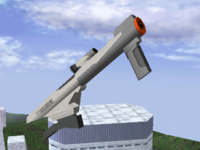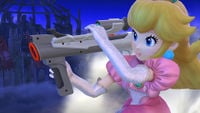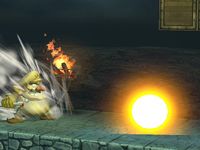Super Scope: Difference between revisions
(→Origin) |
m (→Origin) |
||
| Line 17: | Line 17: | ||
==Origin== | ==Origin== | ||
[[File:SuperScopePhoto.jpg|thumb|300px|left|A Super Scope on a table.]] | [[File:SuperScopePhoto.jpg|thumb|300px|left|A Super Scope on a table.]] | ||
The Super Scope was released in September 1992 in the United States and European markets (the latter as the Nintendo Scope), shortly after the release of the actual Super Nintendo Entertainment System; the item was not sold in large quantities in Japan. The Super Scope was intended to act as a successor to the {{s|wikipedia|Zapper}}, and as a result, functionally acted almost identical to its predecessor. Both were {{iw|wikipedia|light gun}}s, though the Super Scope was wireless and took on a shape more similar to that of a {{iw|wikipedia|bazooka}}. | The Super Scope was released in September 1992 in the United States and European markets (the latter as the Nintendo Scope), shortly after the release of the actual Super Nintendo Entertainment System; the item was not sold in large quantities in Japan. The Super Scope was intended to act as a successor to the {{s|wikipedia|Zapper}}, and as a result, functionally acted almost identical to its predecessor. Both were {{iw|wikipedia|light gun}}s, though the Super Scope was wireless and took on a shape more similar to that of a {{iw|wikipedia|bazooka}}. The Super Scope was the first wireless device by Nintendo to reach the market, though its status as a peripheral makes some historians dispute calling it the first wireless controller by Nintendo, instead giving that honor to the [[GameCube]] [[WaveBird]] controller released 10 years later. | ||
In both the United States and Europe, the peripheral came bundled with ''Super Scope 6'' (''Nintendo Scope 6'' in Europe). The game featured six games within it that all acted as introductions to the Super Scope itself. In one of these games, ''Confront'', the player is tasked with stopping an invasion of enemy ships; in order to do so, they were given an endless stockpile of ammunition that they could fire at these ships. These shots were small and yellow, and these rounds would later reappear as the primary output of the weapon in the ''Smash Bros.'' series. | In both the United States and Europe, the peripheral came bundled with ''Super Scope 6'' (''Nintendo Scope 6'' in Europe). The game featured six games within it that all acted as introductions to the Super Scope itself. In one of these games, ''Confront'', the player is tasked with stopping an invasion of enemy ships; in order to do so, they were given an endless stockpile of ammunition that they could fire at these ships. These shots were small and yellow, and these rounds would later reappear as the primary output of the weapon in the ''Smash Bros.'' series. | ||
Latest revision as of 18:36, August 13, 2024
| Super Scope | |
|---|---|
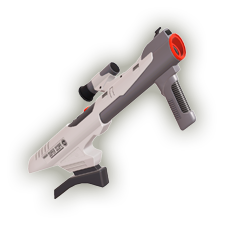  Artwork of a Super Scope from Ultimate. | |
| Universe | Nintendo |
| Appears in | Melee Brawl SSB4 Ultimate |
| Item class | Shooting |
| Article on Super Mario Wiki | Super Scope |
| “ | Fires small blasts and charged shots. | ” |
| —Super Smash Bros. Brawl instruction booklet description | ||
The Super Scope (スーパースコープ, Super Scope), known as the Nintendo Scope in the PAL region versions of Super Smash Bros. Brawl, Super Smash Bros. 4, and Super Smash Bros. Ultimate, is a shooting item that appears in Super Smash Bros. Melee, Super Smash Bros. Brawl, Super Smash Bros. 4, and Super Smash Bros. Ultimate, based on a real-life peripheral from Nintendo.
Origin[edit]
The Super Scope was released in September 1992 in the United States and European markets (the latter as the Nintendo Scope), shortly after the release of the actual Super Nintendo Entertainment System; the item was not sold in large quantities in Japan. The Super Scope was intended to act as a successor to the Zapper, and as a result, functionally acted almost identical to its predecessor. Both were light guns, though the Super Scope was wireless and took on a shape more similar to that of a bazooka. The Super Scope was the first wireless device by Nintendo to reach the market, though its status as a peripheral makes some historians dispute calling it the first wireless controller by Nintendo, instead giving that honor to the GameCube WaveBird controller released 10 years later.
In both the United States and Europe, the peripheral came bundled with Super Scope 6 (Nintendo Scope 6 in Europe). The game featured six games within it that all acted as introductions to the Super Scope itself. In one of these games, Confront, the player is tasked with stopping an invasion of enemy ships; in order to do so, they were given an endless stockpile of ammunition that they could fire at these ships. These shots were small and yellow, and these rounds would later reappear as the primary output of the weapon in the Smash Bros. series.
Overview[edit]
In both Melee and Brawl, the Super Scope acts as a long-ranged weapon that the user can wield in order to not only increase their range, but their raw power as well. If the player constantly taps the A button, they will fire a constant stream of small shots, each of which does little knockback and damage, creating a "trapping" effect. When using it against aerial opponents, it will produce very weak meteor smash, making it ineffective against opponents close to the stage. Holding down the A button, however, charges the weapon, allowing for stronger and larger shots; at full power, the shots can deal in excess of 20% damage, with significant knockback potentially KOing opponents, as well as an added flame effect.
Super Scope shots are considered to be energy-based projectiles; as a result, they can be reflected and absorbed. In addition, the projectiles can potentially be deflected by weakly angled surfaces.
The Super Scope has limited ammunition reserves in it. Its "ammo" is 48, and different charge levels of shots will increase the ammo used. Small shots will use 1 ammo, a slightly charged shot will use 2, then 4, 8, and 16 (max). Firing 48 small shots or three fully-charged shots is enough to deplete the Super Scope, and attempting to use it after it runs out of ammunition causes it to fire nothing but a puff of smoke; at this point, the player can throw the weapon at opponents for a little extra knockback and damage.
In Brawl, the Super Scope became slightly more flexible than its Melee incarnation. A buff added to all projectile weapons meant that characters could run and jump while using projectiles; in the case of the Super Scope, this makes it easier to land charged shots. However, uncharged shots no longer pass through enemies, making it more difficult to trap multiple enemies within a steady stream of shots.
The weapon received another buff in Super Smash Bros. for Nintendo 3DS, as the Super Scope now has 72 shots available for use instead of 48; as a result, it is now possible to fire five fully-charged shots instead of three. The Super Scope, however, did receive a nerf: its shots are narrower and more elongated compared to the two previous games, making their overall hitbox size considerably smaller. Peculiarly, the shots are not narrowed for the Wii U version and keep their spherical shape from Melee and Brawl.
In Ultimate, the Super Scope is used in the credits sequences for Classic Mode.
Use in glitches[edit]
A rollover bug in Melee can cause the Super Scope to gain "infinite" ammunition. While this is a useful glitch in itself, it is often used in order to perform the Black hole glitch,
Damage[edit]
In Brawl, the momentum of a projectile will affect the damage a character will receive; these are recorded in bounces.
| Action | SSB | Melee | Brawl | SSB4 |
|---|---|---|---|---|
| Drop | N/A | 11% | 11% | |
| Forward tilt throw | N/A | 12% | 12% | |
| Up tilt throw | N/A | 13% | 13% | |
| Down tilt throw | N/A | 13% | 14% | |
| Dash throw | N/A | 14% | 14% | |
| Forward smash throw | N/A | 15% | 15% | |
| Up smash throw | N/A | 16% | 16% | |
| Down smash throw | N/A | 16% | 18% | |
| Aerial forward tilt throw | N/A | 12% | 12% | |
| Aerial up tilt throw | N/A | 13% | 13% | |
| Aerial down tilt throw | N/A | 14% | 14% | |
| Aerial forward smash throw | N/A | 12% | 12% | |
| Aerial up smash throw | N/A | 13% | 13% | |
| Aerial down smash throw | N/A | 14% | 14% |
Stages[edit]
These are the stages of damages and knockback for the Super Scope in Brawl. There are a total of eight stages with seven stages of charging and the fully charged stage, each stage increases the damage and knockback that the Super Scope does.
| Damage | Percent that can KO | |
|---|---|---|
| Stage 1 | 1% | N/A (cannot KO) |
| Stage 2 | 7% | 277% |
| Stage 3 | 10% | 226% |
| Stage 4 | 13% | 174% |
| Stage 5 | 16% | 148% |
| Stage 6 | 20% | 122% |
| Stage 7 | 24% | 99% |
| Stage 8 | 28% | 82% |
In Smash Tour[edit]
The Super Scope is one of the many trophy items that can be obtained during the Smash Tour mode. It has a red base, and when used it will allow the player to start one battle holding a Super Scope.
Trophies[edit]
In Super Smash Bros. Melee[edit]
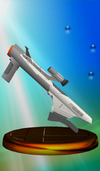
- Super Scope
- A peripheral device for the Super Nintendo Entertainment System, the Super Scope is a wireless weapon that shoots infrared light to a receiver placed on top of the television. In Super Smash Bros. Melee, it can be fired rapidly or charged up to release a more powerful blast. It only has enough energy for 3 charge shots.
- Super Scope (9/92)
In Super Smash Bros. Brawl[edit]
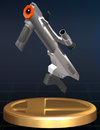
Super Scope
Nintendo Scope
- A bazooka-shaped peripheral for the Super Nintendo Entertainment System that was used wirelessly with an infrared sensor placed on top of the television. In Smash Bros., it can be fired rapidly or charged up. In Super Smash Bros. Melee, you could not move while shooting it, but in this game, you can move and jump while blasting!
: Super Scope 6
: Nintendo Scope 6
In Super Smash Bros. 4[edit]
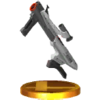
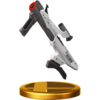
Super Scope
Nintendo Scope
 The wireless weapon from the SNES era can be used kind of like a bazooka in battle. Press the attack button rapidly to spray shots, or hold it down to charge up a powerful blast. The weapon's ammo won't last forever, however, so try not to get caught without juice left in your batteries.
The wireless weapon from the SNES era can be used kind of like a bazooka in battle. Press the attack button rapidly to spray shots, or hold it down to charge up a powerful blast. The weapon's ammo won't last forever, however, so try not to get caught without juice left in your batteries. This wireless weapon from the SNES era can be used kind of like a bazooka in battle. Press the attack button rapidly to spray shots, or hold it down to charge up a powerful blast. The weapon's ammo won't last forever, however, so try not to get caught without juice left in your batteries.
This wireless weapon from the SNES era can be used kind of like a bazooka in battle. Press the attack button rapidly to spray shots, or hold it down to charge up a powerful blast. The weapon's ammo won't last forever, however, so try not to get caught without juice left in your batteries.: Super Scope 6 (02/1992)
This wireless peripheral for the SNES can be used as a kind of bazooka in this game. And it comes with two different firing modes! Press the attack button repeatedly or hold it down to try them out! However, depending on how you use it, the batteries might run out pretty quick. And if they do, the fun's over. That's it!
: Nintendo Scope 6 (08/1994)
Spirits[edit]
Equipping the Landmaster, Zero (Metal Gear Solid 3), Auto, Formula, or Tank & Infantry support spirits will give the player a Super Scope at the start of their stock.
| No. | Image | Name | Type | Class | Cost | Ability | Series |
|---|---|---|---|---|---|---|---|
| 392 | Landmaster | ★★ | 2 | Super Scope Equipped | Star Fox Series | ||
| 764 | Zero (Metal Gear Solid 3) | ★★ | 2 | Super Scope Equipped | Metal Gear Solid Series | ||
| 871 | Auto | ★★ | 2 | Super Scope Equipped | Mega Man Series | ||
| 965 | Formula | ★★ | 2 | Super Scope Equipped | Xenoblade Chronicles Series | ||
| 1,134 | Tank & Infantry | ★★ | 2 | Super Scope Equipped | Famicom Wars Series |
Gallery[edit]
Names in other languages[edit]
Trivia[edit]
- The Super Scope was intended to be held somewhat similarly to a rocket launcher or a sniper rifle, with the back of the weapon resting on the user's shoulder and the user peering down the scope. While some characters wield the weapon normally (such as Mario, Ness, and Fox), some instead hold the weapon underneath their shoulder more akin to a rifle, while others hold it in more peculiar ways. There aren't any characters who hold the weapon the way it is intended to function; holding the grip with the opposing hand, looking down the sight, and using the other hand to press the fire button behind the sight.
- The Super Scope's descriptions in SSB4 mentioning the depletion of batteries might be a reference to the real-life Super Scope's infamous battery consumption, being one of the main reasons for its lack of success.
| Items in Super Smash Bros. Melee | |
|---|---|
| Normal | Barrel Cannon · Beam Sword · Bob-omb · Bunny Hood · Cloaking Device · Fan · Fire Flower · Flipper · Food · Freezie · Green Shell · Hammer · Heart Container · Home-Run Bat · Lip's Stick · Maxim Tomato · Metal Box · Motion-Sensor Bomb · Mr. Saturn · Parasol · Poison Mushroom · Poké Ball · Ray Gun · Red Shell · Screw Attack · Star Rod · Starman · Super Mushroom · Super Scope · Warp Star |
| Containers | Barrel · Capsule · Crate · Egg · Party Ball |
| Other | Smash Coins |
| Items in Super Smash Bros. Brawl | |
|---|---|
| Normal | Assist Trophy · Banana Peel · Beam Sword · Blast Box · Bob-omb · Bumper · Bunny Hood · Cracker Launcher · Deku Nut · Dragoon · Fan · Fire Flower · Food · Franklin Badge · Freezie · Golden Hammer · Gooey Bomb · Green Shell · Hammer · Heart Container · Home-Run Bat · Hothead · Lightning Bolt · Lip's Stick · Maxim Tomato · Metal Box · Motion-Sensor Bomb · Mr. Saturn · Pitfall · Poison Mushroom · Poké Ball · Ray Gun · Screw Attack · Smart Bomb · Smash Ball · Smoke Ball · Soccer Ball · Spring · Star Rod · Starman · Super Mushroom · Super Scope · Superspicy Curry · Team Healer · Timer · Unira · Warp Star |
| Containers | Barrel · Capsule · Crate · Party Ball · Sandbag · Rolling Crates |
| The Subspace Emissary |
Key · Stock Ball · Trophy Stand |
| Collectibles | CD · Coins · Sticker · Trophy |
| Other | Smash Coins and Bills |
| Smash Tour | |
|---|---|
| Red items | Back Shield · Black Knight · Bob-omb · Boo · Bunny Hood · Daisy (Baseball) · Darkrai · Dixie Kong · DK Barrel · Energy Tank · Franklin Badge · Hammer · Home-Run Bat · Kat & Ana · Latias & Latios · Magnus · Majora's Mask · Mecha-Fiora · Metal Box · Mr. Resetti · Mr. Saturn · Ore Club · Phosphora · Plasm Wraith · Poison Mushroom · Rocket Belt · Sidestepper · Steel Diver · Super Mushroom · Super Scope · Ultimate Chimera · Wolfen · X Bomb |
| Blue items | Ashley · Boss Galaga · Bus to the City · Chain Chomp · Dillon · Doc Louis · Excitebike · Ghosts (Luigi's Mansion) · Great Fox · Isabelle · POW Block · Riki · Snorlax · Super Star · Tetra · Timmy & Tommy · Tingle · Yellow Wollywog · Zinger |
| Green items | Porky Minch · Proto Man · Substitute Doll |
| Random events | Banzai Bill · Flying Man · Iridescent Glint Beetle · Kamek · Koffing · Metal Face · Metroid · Nabbit · Reaper · Ridley · Souflee · Tac · Yellow Devil |
